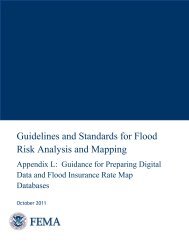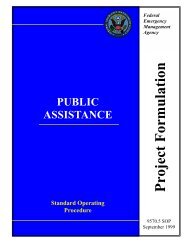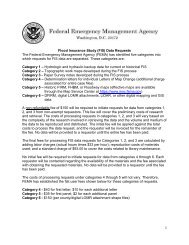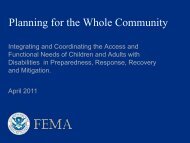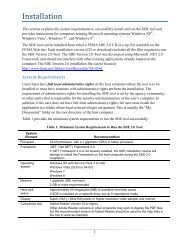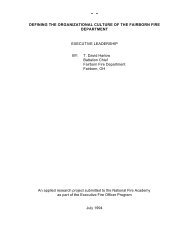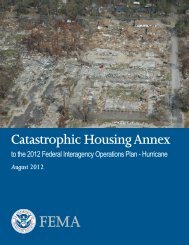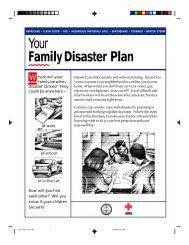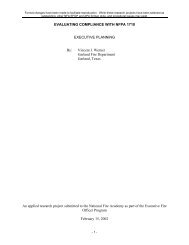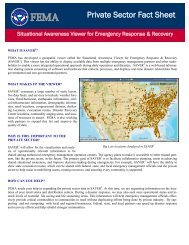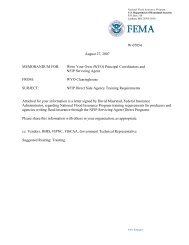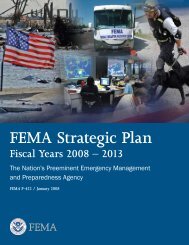Joint Field Office Activation and Operations - Federal Emergency ...
Joint Field Office Activation and Operations - Federal Emergency ...
Joint Field Office Activation and Operations - Federal Emergency ...
You also want an ePaper? Increase the reach of your titles
YUMPU automatically turns print PDFs into web optimized ePapers that Google loves.
UNCLASSIFIED3 to Annex B of this SOP.1.7 Establish ResponsibilityWhen all participants in the interagency process underst<strong>and</strong> what needs to be done, agreeupon the means to accomplish it, <strong>and</strong> identify who will do what through coordination, acommon sense of ownership <strong>and</strong> commitment toward resolution help achieve unity of effort.The resources required for a mission must be painstakingly identified, with specific <strong>and</strong>agreed-upon responsibility assigned to the agency(s) that will provide those resources. Toreceive proper reimbursement for materiel support, agencies must establish carefulaccounting procedures.1.8 Plan for the Transition of Key Responsibilities, Capabilities, <strong>and</strong>FunctionsImmediately upon initiating interagency coordination, it is imperative to plan for thetransition of responsibility for specific actions or tasks from emergency to more routineentities. This planning usually occurs simultaneously at the national level. Wheninteragency transition planning (including assignment of specific responsibilities <strong>and</strong>timelines for accomplishment) does not occur, JFO involvement may be needlesslyprotracted. As coordination plans are developed at the JFO Coordination Group level,effective transition planning should also be a primary consideration. The JFO CoordinationGroup should anticipate the need to “ratchet down” coordination <strong>and</strong>/or direct incidentsupport to lessen the impact of transitioning to other “routine ops” organizations.1.9 Direct All Means Toward Unity of EffortAchieving unity of effort can be made more complex by the number of participants,distinctive agency cultures, undefined relationships among the agencies, <strong>and</strong> differingobjectives. The principle of unity of effort pertains directly to interagency coordination.Unity will lead to success for the mission, not a zero-sum equation among the agencies.Achieving this principle begins by identifying agencies that have the requisite capabilities toreach the common objective or a need to adapt their wide-area operations in light of theincident response <strong>and</strong> by bringing their core competencies to the interagency forum. Becausethe principles of Unified Comm<strong>and</strong> apply to the JFO Coordination Group, the objectives area reflection of the agencies’ collective approach rather than “tasking” from a seniorcomm<strong>and</strong>er. Concerns of national authorities <strong>and</strong> the IAC may well be conveyed to the JFOCoordination Group <strong>and</strong> may ultimately influence the JFO Coordination Plan objectives.1.10 Media Impact on Interagency CoordinationThe formulation <strong>and</strong> execution of any policy must consider the public’s traditional values ifthe policy is to be successful. The media can be a powerful force in shaping public attitudes<strong>and</strong> policy development. The media often has a dramatic influence on the interagencyprocess—whether at the strategic decision-making level of the IAC or in the field as agencies<strong>and</strong> NGOs vie for public attention. Coordination plans that include interaction with theseagencies should anticipate the importance that public affairs <strong>and</strong> media relations have on theoperation <strong>and</strong> in the interagency process. As early as possible in the planning process, all25Version 8.3Interim Approval April 28, 2006



